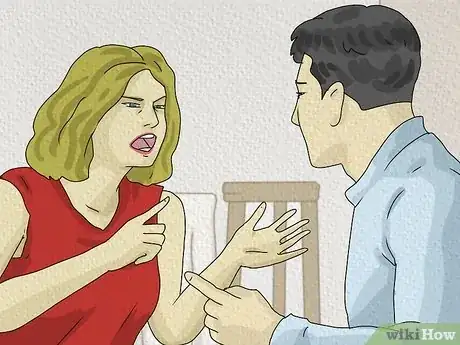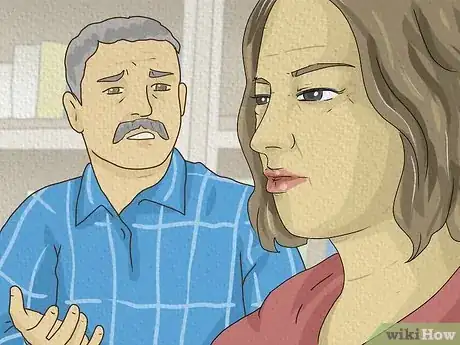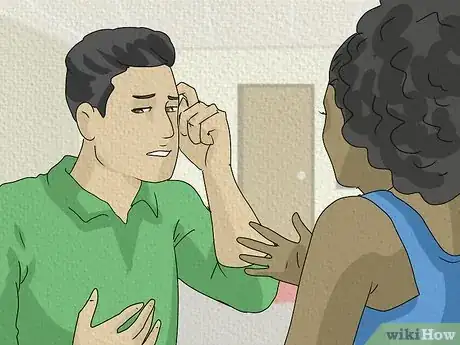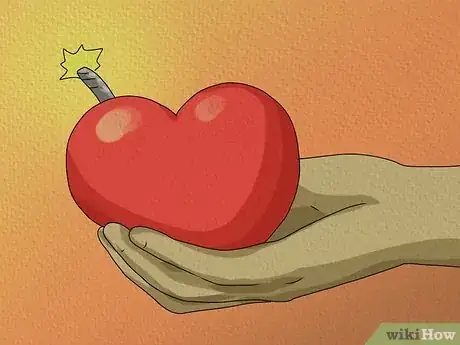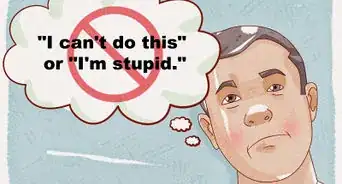This article was co-authored by Lena Dicken, Psy.D and by wikiHow staff writer, Aly Rusciano. Dr. Lena Dicken is a Clinical Psychologist based in Santa Monica, California. With over eight years of experience, Dr. Dicken specializes in therapy for anxiety, depression, life transitions, and relationship difficulties. She utilizes an integrative approach combining Psychodynamic, Cognitive Behavioral, and Mindfulness-based therapies. Dr. Dicken holds a BS in Integrative Medicine from the University of Hawaii at Manoa, an MA in Counseling Psychology from Argosy University Los Angeles, and a Doctor of Psychology (Psy.D) in Clinical Psychology from the Chicago School of Professional Psychology at Westwood. Dr. Dicken’s work has been featured in GOOP, The Chalkboard Magazine, and in numerous other articles and podcasts. She is a licensed psychologist with the state of California.
Not all relationships are perfect, but some may be more troublesome than others. Perhaps your friend, partner, family member, or coworker said or did something recently that left you questioning, “Are they toxic?” Acknowledging the signs of toxic behavior can be the first step to understanding the whys and hows of a toxic relationship, which is why we’ve put together this article. Take a look at the top 7 signs of a toxic person to see if someone you know really is toxic.
Things You Should Know
- Toxic people are poor communicators who make you feel insecure about yourself.
- A toxic person is a skillful gaslighter and causes you to second guess yourself, even when you know you’re right.
- They like to put blame on others to appear better than everyone else.
Steps
Expert Q&A
-
QuestionHow do you turn the tables on a gaslighter?
 Lena Dicken, Psy.DDr. Lena Dicken is a Clinical Psychologist based in Santa Monica, California. With over eight years of experience, Dr. Dicken specializes in therapy for anxiety, depression, life transitions, and relationship difficulties. She utilizes an integrative approach combining Psychodynamic, Cognitive Behavioral, and Mindfulness-based therapies. Dr. Dicken holds a BS in Integrative Medicine from the University of Hawaii at Manoa, an MA in Counseling Psychology from Argosy University Los Angeles, and a Doctor of Psychology (Psy.D) in Clinical Psychology from the Chicago School of Professional Psychology at Westwood. Dr. Dicken’s work has been featured in GOOP, The Chalkboard Magazine, and in numerous other articles and podcasts. She is a licensed psychologist with the state of California.
Lena Dicken, Psy.DDr. Lena Dicken is a Clinical Psychologist based in Santa Monica, California. With over eight years of experience, Dr. Dicken specializes in therapy for anxiety, depression, life transitions, and relationship difficulties. She utilizes an integrative approach combining Psychodynamic, Cognitive Behavioral, and Mindfulness-based therapies. Dr. Dicken holds a BS in Integrative Medicine from the University of Hawaii at Manoa, an MA in Counseling Psychology from Argosy University Los Angeles, and a Doctor of Psychology (Psy.D) in Clinical Psychology from the Chicago School of Professional Psychology at Westwood. Dr. Dicken’s work has been featured in GOOP, The Chalkboard Magazine, and in numerous other articles and podcasts. She is a licensed psychologist with the state of California.
Clinical Psychologist Lean on your internal self-worth and confidence in your own feelings. A big problem with gaslighting is that the victim is not grounded enough in their sense of self to speak up against the gaslighter. If you don't believe that your feelings are valid, you're going to either believe the gaslighter or at least feel confused or unsure of what's happening.
Lean on your internal self-worth and confidence in your own feelings. A big problem with gaslighting is that the victim is not grounded enough in their sense of self to speak up against the gaslighter. If you don't believe that your feelings are valid, you're going to either believe the gaslighter or at least feel confused or unsure of what's happening.
References
- ↑ https://www.forbes.com/sites/travisbradberry/2015/11/10/10-toxic-people-you-should-avoid-at-all-costs/?sh=1144599261db
- ↑ https://smartcouples.ifas.ufl.edu/married/domestic-violence-and-abuse/what-is-gaslighting/
- ↑ https://www.thesource.org/post/10-signs-youre-in-a-toxic-friendship
- ↑ https://health.clevelandclinic.org/toxic-parenting-traits/
- ↑ https://www.thesource.org/post/10-signs-youre-in-a-toxic-friendship
- ↑ https://mhanational.org/eliminating-toxic-influences
- ↑ https://health.clevelandclinic.org/toxic-parenting-traits/
- ↑ https://time.com/5274206/toxic-relationship-signs-help/
